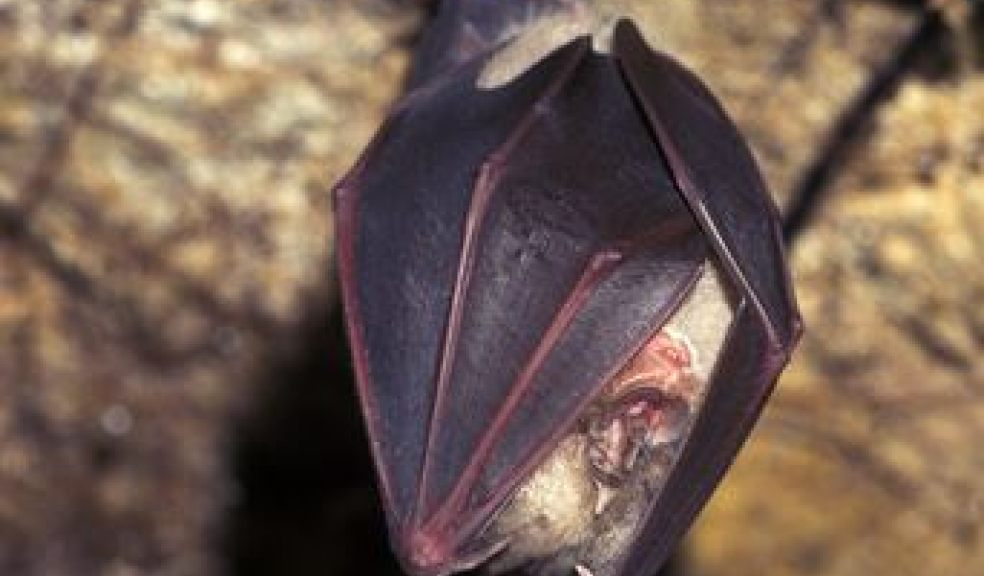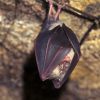
Bat colony future to be decided at High Court
The future of a population of one of northern Europe’s most threatened wildlife species will be the focus of a High Court action in Bristol on Friday 12 June. The court granted permission for the claim to proceed in April 2014.
The charity Devon Wildlife Trust is bringing the Judicial Review against a planning decision made by Teignbridge District Council to grant permission for up to 230 houses to be built on land which lies just 170 metres from an internationally important site where female greater horseshoe bats congregate to give birth and raise their young. Devon Wildlife Trust has taken this unusual step in the court because the Rocklands development on the edge of Chudleigh, in South Devon, will pose a serious threat to the future of these rare bats.
Chudleigh’s population of greater horseshoe bats is one of the largest left in the UK but overall the species is in serious decline. The Devon bats use a site close to the Chudleigh town centre as a place to hibernate in winter and as a summer maternity roost in which to raise their young. The caves have protection from disturbance and development, and form part of the South Hams Special Area of Conservation. However, this same protection does not extend to the surrounding green fields and hedgerows which act as vital feeding grounds and flightpaths for the bats. It is the decision of Teignbridge District Council to permit a development of 230 houses in this bat-friendly landscape that Devon Wildlife Trust is taking court action to try to overturn.
Devon Wildlife Trust’s Chief Executive Harry Barton said: "These bats are some of the rarest UK mammals and Devon’s rural landscapes offer one of the last places which they have left.
"The importance of the decision by the High Court on Friday cannot be overstated. We believe that the needs of the species haven’t been properly taken into consideration in the decision to give the go ahead for 230 houses to be built so close by.
"We recognise that there is an acute housing shortage in the country. However, this case is about ensuring we have the right scale of development in the right place.
"Chudleigh has grown by 67% since 1950 and is scheduled to expand by a further 435 homes. During the same period the extent of hedgerows, which the bats use to navigate to their favourite foraging grounds, have halved. Cramming development into the remaining green fields around the town threatens the future of this special landscape and the bats and other wildlife which it supports.
"Farmers in Chudleigh have been working hard to reverse the decline in greater horseshoe populations by maintaining wildflower rich, cattle grazed pastures. It is ironic that this hard work could be undone forever by poor planning decisions."
Greater horseshoe bats have suffered a catastrophic decline in the past 100 years. This large bat, with a wingspan of almost 40cm, was once common across southern England, but changes in land-use such as urban development and a move away from cattle grazed pastures and hay meadows has seen its numbers tumble by more than 90% since the early 1900s. This has left greater horseshoe bats clinging on in just a few areas.
Devon remains one place where the bats can still be seen and supports the largest population in the whole of northern Europe. With just 6,500 greater horseshoe bats left in the UK, a third of these survive in the county. Devon’s greater horseshoe bats are now restricted to just 11 key roosts. But now with the Chudleigh roost threatened by a housing development, Devon Wildlife Trust is concerned that the endangered species will be dealt a devastating blow.
Mr Barton said: "We have opposed this housing development from its beginnings in 2013; we opposed it at its initial application stage and at a public hearing, all without success. We are very concerned that this may be the last chance we have to make a difference to the greater horseshoe bats of Chudleigh and this is why we had no option but to take Teignbridge District Council to the High Court.
"We are also holding authorities to account which have to adhere to the most important wildlife legislation in the Country, the European Habitat Regulations. This critical legislation is there to support our most endangered habitats and species populations and is currently under threat by moves to reduce its powers. We hope that our case will set a clear precedent that will help give endangered species populations across Europe a brighter future."
The Judicial Review is being heard on Friday 12 June at the High Court in Bristol. The solicitors acting for Devon Wildlife Trust are Richard Buxton Environmental & Public Law and the barrister is Jenny Wigley, No 5 chambers.

















